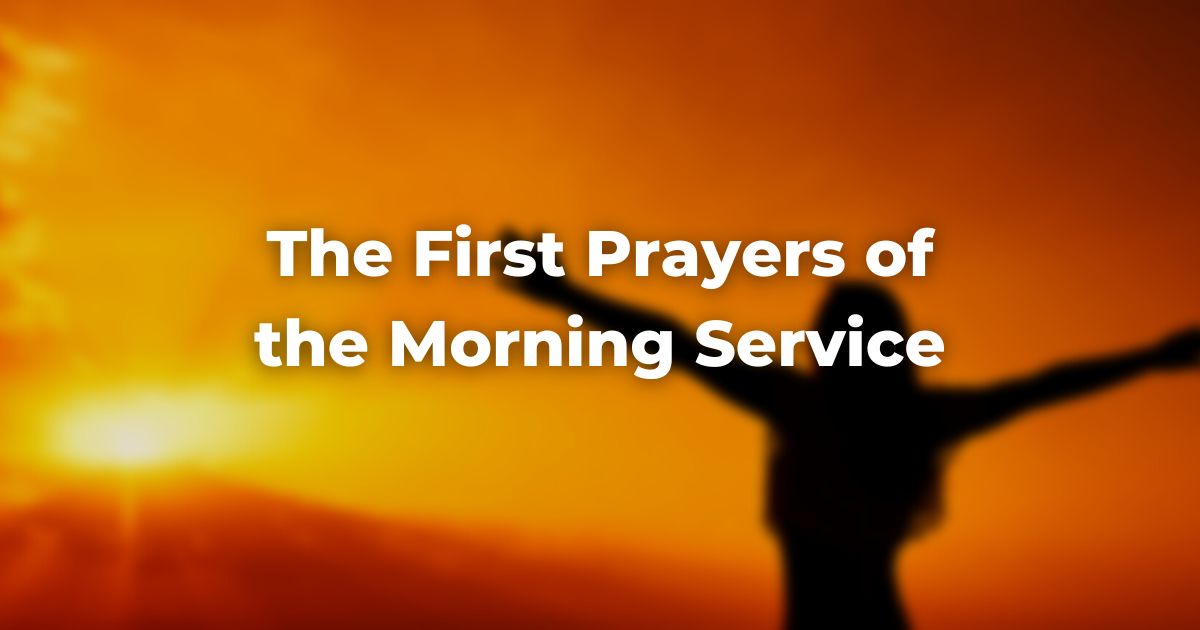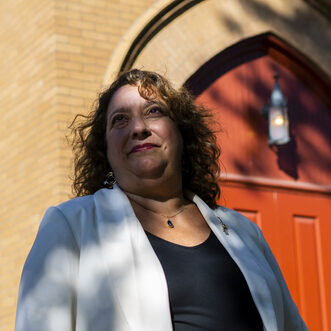Table of Contents
The following prayers are at the very beginning of the morning service. These prayers help us to start our day with intention and gratitude.
Modeh/Modah Ani
The first thing a person should do upon awakening in the morning is to recite the Modeh Ani prayer.
The words modeh ani mean “I am grateful” or “I acknowledge.” The prayer goes on to specify that the waking individual both acknowledges and is grateful to God for the restoration of the soul following the dormancy of sleep.
This statement of faith reasserts God’s daily presence and compassion in our lives.
To use the feminine form of the opening verb say modah ani.
Birkhot Ha-shaḥar
The early morning benedictions (Birkhot Ha-shaḥar or Birchot HaShachar) are a series of blessings that refer serially to those of God’s gifts we acknowledge as we rise in the morning and prepare to begin the day.
Once, it was customary to recite a benediction for each part of one’s morning routine as each deed was accomplished: when washing one’s hands, upon dressing for the day, upon putting on one’s shoes, and so on.
Maimonides (Mishneh TorahRefers to the first five books of the Hebrew Bible, the Tanakh, also called the Five Books of Moses, Pentateuch or the Hebrew equivalent, Humash. This is also called the Written Torah. The term may also refer to teachings that expound on Jewish tradition. Read more, Prayer and the Priestly Blessing 7:1–8) followed the lead of the TalmudReferring to one of two collections, the Jerusalem and Babylonian Talmuds, edited in the 6th century, that contains hundreds of years of commentary, discussion, and exploration of the ideas in the Mishnah. One could describe it as Mishnah + Gemara = Talmud Read more and ordained that just such a procedure be followed and that the blessings be pronounced as they naturally devolve upon an individual.
We follow the later codes, however, and include all the benedictions at the beginning of the Morning Service (Shulchan Arukh, Orach Chayim 46:1–2).
It is also customary to include a section of Torah study in the early part of the Morning Service and to follow it with the recitation of the Kaddish D’rabbanan, the Kaddish for teachers and students.
Incorporating the study of Torah into the daily liturgy provides an opportunity to fulfill the commandment of daily study even when time is limited.
This introductory section of the morning liturgy concludes with the thirtieth psalm (Psalms 30), after which the Mourner’s Kaddish is recited.
P’sukei D’zimra
Rabbi Simlai is quoted in the Talmud at BT Berakhot 32a as saying that we should always recount the praises due God before we actually recite our prayers.
This idea developed eventually into the practice of reciting a series of psalms, now called P’sukei D’zimra (Verses of Song), before the formal beginning of the service. This begins and ends with a blessing and comprises miscellanies of biblical verses and full chapters of several psalms, including Psalms 100 and Psalms 145–150.
P’sukei D’zimra also includes a full liturgical rendition of the Song of the Sea (Exodus 15:1–18).
The Song of the Sea celebrates the drowning of the Egyptians, but the point of its recitation is not to revel in the downfall of others. Rather it is to recognize the role of the miraculous in the history of Israel and to glorify God’s supreme rule over all nations.
Adapted with permission from The Observant Life.
Authors
-

Rabbi Dr. Karen G Reiss Medwed, works in higher education, as a Senior Assistant Dean for Faculty Affairs and Network Engagement. Dr. Reiss Medwed's scholarship includes understanding the growth of the field of digital education and instruction in higher education, K-12 education and faith-based education. Dr. Reiss Medwed was ordained by JTS in 1995, and earned her Ph.D. from New York University's Steinhardt School of Education in Curriculum, Teaching and Learning with a specialization in Jewish education in 2005. She was a Steinhardt Fellow for the four years of her doctoral studies. She went on to design and develop a Master of Education program in Faith-Based Education at the University of Pennsylvania's Graduate School of Education. Dr. Medwed has studied the development of innovative practices for digital learning and instruction and leadership in higher education.
View all posts -



The Observant Life: The Wisdom of Conservative Judaism for Contemporary Jews distills a century of thoughtful inquiry into the most profound of all Jewish questions: how to suffuse life with timeless values, how to remain loyal to the covenant that binds the Jewish people and the God of Israel, and how to embrace the law while retaining an abiding sense of fidelity to one’s own moral path in life. Written in a multiplicity of voices inspired by a common vision, the authors of The Observant Life explain what it means in the ultimate sense to live a Jewish life, and to live it honestly, morally, and purposefully. The work is a comprehensive guide to life in the 21st Century. Chapters on Jewish rituals including prayer, holiday, life cycle events and Jewish ethics such as citizenship, slander, taxes, wills, the courts, the work place and so much more.
View all posts






